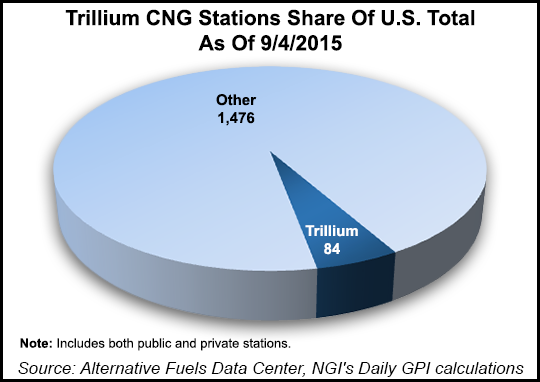Infrastructure | NGI All News Access
WEC Energy Group Selling Trillium CNG
Trillium CNG, a provider of compressed natural gas (CNG) to transportation fleets, reportedly is being put up for sale by its new parent company, Milwaukee-based WEC Energy Group.

WEC Energy acquired Trillium as part of its acquisition of Chicago-based gas utility holding company Integrys Energy (see Daily GPI,June 30).
A provider of CNG fueling stations and maintenance, Trillium’s unregulated natural gas vehicle (NGV) business is not viewed by WEC as a good fit with its regulated natural gas and electric utility businesses. There would be about $140 million in assets involved in the Trillium sale, said a WEC spokesperson, adding that more details on the upcoming transaction would be available in the company’s 10Q filing with the Securities and Exchange Commission in November.
In the CNG market sector, WEC touts Trillium as a company with a growth profile in a rapidly developing North American CNG industry, but it said the CNG firm would require additional investment to grow, the spokesperson said. “We see significant value in Trillium, which is a highly respected brand; however, it is inconsistent with our risk profile.”
WEC has retained Barclays and Lazard to serve as financial advisers in connection with a potential sale of Integrys Transportation Fuels, which operates as Trillium.
Separately, Southern California Gas Co. (SoCalGas) said on Wednesday it completed its first project under its newly authorized compression services tariff (see Daily GPI, Dec. 24, 2013), with the opening of a state-of-the-art CNG fueling station in Monterey Park, a suburb east of downtown Los Angeles. The 24/7 public access station would support the city’s bus fleet and other NGVs.
SoCal said the newest station adds to California’s nation-leading network of nearly 600 natural gas fueling stations, more than 25% of which are public-access facilities. The Los Angeles-based Sempra Energy utility continues to promote NGVs for their “significant environmental, energy security and economic benefits.”
“NGVs can have an immediate and positive impact on the issues of air quality and public health, and SoCalGas is delighted to celebrate the city of Monterey Park’s fueling facility,” said SoCalGas Vice President for Customer Solutions Rodger Schwecke.
Monterey Park’s Ron Bow, assistant city manager and public works director, said the CNG station would help the city reduce CNG fuel costs by about 50%, along with reducing the city’s carbon footprint.
Another Wisconsin-based company, CMD Corp., offers an array of CNG fueling equipment and station services for various branded station builder-operators, such as Gain Clean Fuel. CMD officials said the company has parlayed its 35 years of experience designing and building industrial equipment into becoming “a technology-driven innovator” for CNG fueling stations.
CMD offers fueling stations both custom and stock machinery, replacement parts, upgrade kits, engineering and support services. It is a certified General Electric compressor packager, offering compressors ranging in size from 75 to 400 psi. It also provides both fast-fill and time-fill fueling dispensing equipment.
Another fueling equipment supplier, Nebraska-based Hexagon Lincoln has developed a CNG fuel cylinder for the refuse truck and transit bus markets — a 16-inch diameter Type IV tank. It is being promoted as the “highest capacity, lightest weight” CNG fuel tank available.
“In the race to be the lightest tank on the market, our engineers have never sacrificed durability for weight,” said Hexagon Lincoln’s Chet Dawes, vice president of CNG automotive products. The new tanks are 70% lighter than steel, with a polymer liner that is corrosion-proof, Dawes said.
In Louisiana, CNG station developer and operator TruStar Energy earlier in September opened a public access CNG station in Lafayette, LA. TruStar is developing CNG fueling nationwide.
“Louisiana is one of the nation’s leading producers of natural gas, so fueling fleets with state-produced CNG brings economic vitality, reduces transportation-related emissions and creates more local jobs,” said Lauren Lambert-Tompkins, Clean Cities co-coordinator for the state’s clean fuels program.
The new Lafayette CNG station has two traffic lanes and two fast-fill fueling pumps for both commercial and private NGVs. The station accepts commercial fuel cards, as well as all major credit cards.
Back in Southern California, UK-based Greenlane Biogas is helping upgrade a new anaerobic digester in Perris, CA, 60 miles southeast of Los Angeles, to provide about 1 million diesel gallon equivalents (DGE) of renewable natural gas (RNG) that Newport Beach, CA-based Clean Energy Fuels markets as its “Redeem” brand RNG. An Orange County 900-truck transportation firm, CR&R, is using Clean Energy’s Redeem for its truck fleet in Garden Grove and Perris.
In Perris, the RNG facility initially would be able to convert 80,000 tons annually of anaerobic digestion from municipal waste into RNG that is eventually converted to CNG.
The CR&R RNG-to-CNG project is being supported by a $4.5 million grant from the California Energy Commission’s alternative vehicle program and up to another $1.4 million from the South Coast Air Quality Management District.
© 2024 Natural Gas Intelligence. All rights reserved.
ISSN © 1532-1231 | ISSN © 2577-9877 |
